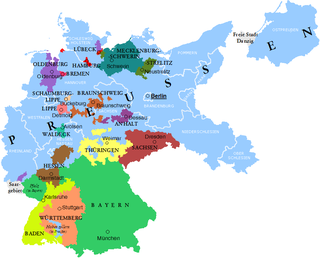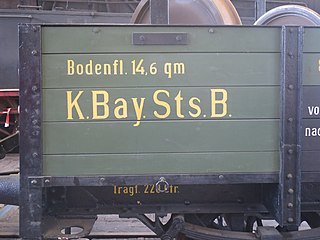Related Research Articles

Bavaria, officially the Free State of Bavaria, is a state in the southeast of Germany. With an area of 70,550.19 km2 (27,239.58 sq mi), it is the largest German state by land area, comprising approximately 1/5 of the total land area of Germany, and with over 13.08 million inhabitants, it is the second most populous German state, behind only North Rhine-Westphalia; however, due to its large land area, its population density is below the German average. Major cities include Munich, Nuremberg, and Augsburg.

The House of Wittelsbach is a former Bavarian dynasty, with branches that have ruled over territories including the Electorate of Bavaria, the Electoral Palatinate, the Electorate of Cologne, Holland, Zeeland, Sweden, Denmark, Norway, Hungary, Bohemia, and Greece. Their ancestral lands of Bavaria and the Palatinate were prince-electorates, and the family had three of its members elected emperors and kings of the Holy Roman Empire. They ruled over the Kingdom of Bavaria which was created in 1805 and continued to exist until 1918.

Wilhelm Johann Harald Hoegner was the second Bavarian minister-president after World War II, and the father of the Bavarian constitution. He has been the only Social Democrat to hold this office since 1920.

Landtag elections in the Free State of Bavaria (Freistaat Bayern) during the Weimar Republic were held at irregular intervals between 1919 and 1932. Results with regard to the total vote, the percentage of the vote won, the number of seats allocated to each party and the change in distribution of seats are presented in the tables below. On 31 March 1933, the sitting Landtag was dissolved by the Nazi-controlled central government and reconstituted to reflect the distribution of seats in the national Reichstag. The Landtag subsequently was formally abolished as a result of the "Law on the Reconstruction of the Reich" of 30 January 1934 which replaced the German federal system with a unitary state.

The Royal Bavarian State Railways was the state railway company for the Kingdom of Bavaria. It was founded in 1844. The organisation grew into the second largest of the German state railways with a railway network of 8,526 kilometres by the end of the First World War.
The Bavarian Group Administration or Gruppenverwaltung Bayern was a largely autonomous railway administration within the Deutsche Reichsbahn between the two world wars. It was formed on 1 April 1920 from the former Bavarian State Railways, and was unique, Bavaria being the only former German state to have such status after the merger of the seven state railway companies into the Reichsbahn. The rest of Germany was simply divided into various regional Reichsbahn railway divisions.
The 1919 Bavarian state election was held on 12 January and 2 February 1919 to elect the 180 members of the Landtag of Bavaria.
The 1920 Bavarian state election was held on 6 June 1920 to elect the 155 members of the Landtag of Bavaria.
The 1928 Bavarian state election was held on 20 May 1928 to elect the 128 members of the Landtag of Bavaria.
The 1932 Bavarian state election was held on 24 April 1932 to elect the 128 members of the Landtag of Bavaria.
The 1924 Thuringia state election was held on 10 February 1924 to elect the 72 members of the Landtag of Thuringia.
The 1924 Mecklenburg-Schwerin state election was held on 17 February 1924 to elect the 64 members of the Landtag of the Free State of Mecklenburg-Schwerin.
The 1932 Mecklenburg-Schwerin state election was held on 5 June 1932 to elect the 59 members of the Landtag of the Free State of Mecklenburg-Schwerin.
The 1918 Mecklenburg-Strelitz state election was held on 15 December 1918 to elect the 42 members of the constituent assembly of the Free State of Mecklenburg-Strelitz.

The Party for Franconia also known as Frankenpartei is a minor party in Germany aimed primarily at people in the Franconian regions of Bavaria.

Landtag elections in the Free State of Mecklenburg-Schwerin (Freistaat Mecklenburg-Schwerin) during the Weimar Republic were held at irregular intervals between 1919 and 1932. Results with regard to the total vote, the percentage of the vote won and the number of seats allocated to each party are presented in the tables below. On 31 March 1933, the sitting Landtag was dissolved by the Nazi-controlled central government and reconstituted to reflect the distribution of seats in the national Reichstag. The Landtag subsequently was formally abolished as a result of the "Law on the Reconstruction of the Reich" of 30 January 1934 which replaced the German federal system with a unitary state.

Landtag elections in the Free State of Oldenburg (Freistaat Oldenburg) during the Weimar Republic were held at irregular intervals between 1919 and 1932. Results with regard to the total vote, the percentage of the vote won and the number of seats allocated to each party are presented in the tables below. On 31 March 1933, the sitting Landtag was dissolved by the Nazi-controlled central government and reconstituted to reflect the distribution of seats in the national Reichstag. The Landtag subsequently was formally abolished as a result of the "Law on the Reconstruction of the Reich" of 30 January 1934 which replaced the German federal system with a unitary state.

Landtag elections in the Free State of Anhalt (Freistaat Anhalt) during the Weimar Republic were held at irregular intervals between 1918 and 1932. Results with regard to the total vote, the percentage of the vote won and the number of seats allocated to each party are presented in the tables below. On 31 March 1933, the sitting Landtag was dissolved by the Nazi-controlled central government and reconstituted to reflect the distribution of seats in the national Reichstag. The Landtag subsequently was formally abolished as a result of the "Law on the Reconstruction of the Reich" of 30 January 1934 which replaced the German federal system with a unitary state.
The June 1924 Anhalt state election was held on 22 June 1924 to elect the 36 members of the Landtag of the Free State of Anhalt.
The November 1924 Anhalt state elections were held on 9 November 1924 to elect the 36 members of the Landtag of the Free State of Anhalt. They were the second state elections of the year after elections in June, making Anhalt the only state in the Weimar Republic to hold two Landtag elections in the same calendar year.
References
- 1 2 Gonschior, Andreas. "Der Freistaat Bayern Landtagswahl 1924". Wahlen in der Weimarer Republik. Archived from the original on 2001-05-15. Retrieved 14 May 2021.
- ↑ Schröder, Valentin. "Landtagswahlen Freistaat Bayern". Wahlen in Deutschland. Archived from the original on 2005-02-23. Retrieved 15 May 2021.